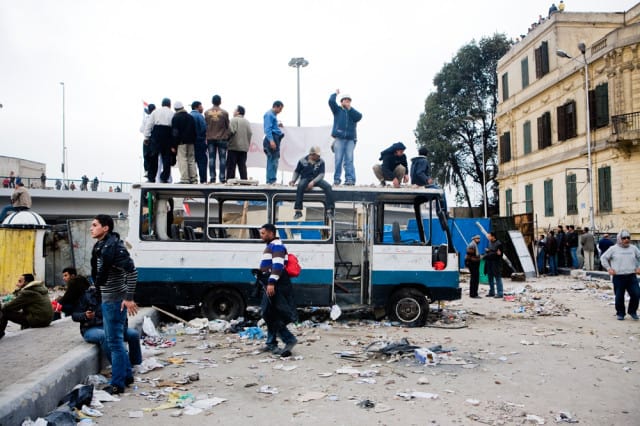
Rubble and burnt vehicles barricade entrances to Tahrir Square where 200 people are protesting against President Mohamed Morsi.
Bill Rafoss, the former chief investigator of the Saskatchewan Human Rights Commission, stopped over in Cairo for four days on his way to monitor the presidential elections in Kenya.
Rafoss last visited Tahrir Square in 2010, one year before the popular uprisings that saw President Hosni Mubarak swept from power. Now, three years later, the University of Saskatchewan political studies sessional lecturer says the country is worse than it was before the revolution.
“Cairo has definitely declined since I was last there in 2010. Cars are getting older, buildings are crumbling, Egyptians seem less happy, many are now unemployed as a result of declining tourism. It is sad and unfortunate to see the current state of affairs,” Rafoss said following his most recent visit.
Both Canadians and Egyptians strongly discouraged Rafoss from visiting Tahrir Square because of the current unrest. Two years after the 2011 revolution the area is still blockaded and about 200 people are occupying the square to protest President Mohamed Morsi, a member of the Muslim Brotherhood.
Only a few days after Rafoss left Cairo, violence erupted in the square once again. According to Egyptian state news, police attempted to remove blockades and protesters reacted violently, throwing petrol bombs. Fifty-five people were arrested.
“The protesters are not happy with the Morsi government,” Rafoss said of the widespread anger and confusion among the people of Egypt.
“They believe that the Muslim Brotherhood is ruling for Muslims only. Others do not know what Morsi and the brotherhood stand for; Morsi has only been in office for [nine] months and his main focus has been on constitutional reform.”
Morsi’s Muslim Brotherhood was elected last June and pushed through a constitution in December that many opponents felt favoured Islamists. The constitution was passed with a majority, but only with a low turnout of 20 per cent of eligible voters.
A parliamentary election is set to take place in April, but many claim Morsi’s election laws have tipped the odds in the Islamists’ favour. An alliance of opposition parties has decided to boycott the elections, hoping to undermine the legitimacy of the vote and then demand a fair election.
“This is a crucial time in Egypt’s history as it struggles to move from the authoritarian government of Hosni Mubarak to a new, more democratic modern government,” Rafoss said of the protests and upcoming election.
Rafoss is now in Kenya, which is also at a crucial point in its struggle for democracy. Accusations of fraud and cheating in the presidential elections five years ago led to widespread violence, leaving over 1,000 dead and 300,000 displaced.
As Kenyans head to the polls this week, the nation braces for the possibility of more fighting. Rafoss is there to lend a hand, monitoring the elections to ensure they are fair and free.
He fears the election results will lead to violence once again.
“People are very nervous here about the election, some moving their families ‘up country’ to a safer location. There is a heavy police presence here on the coast,” Rafoss said.
Both Egypt and Kenya are at pivotal moments in their political histories. The coming weeks and months will reveal if the countries can hold peaceful elections and become successful examples of democratic reform in Africa.
—
Photo: Hossam el Hamalway/Flickr
Leave a Reply